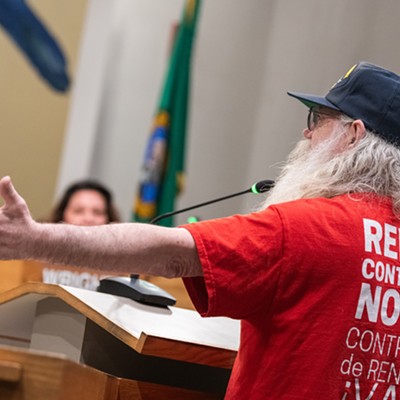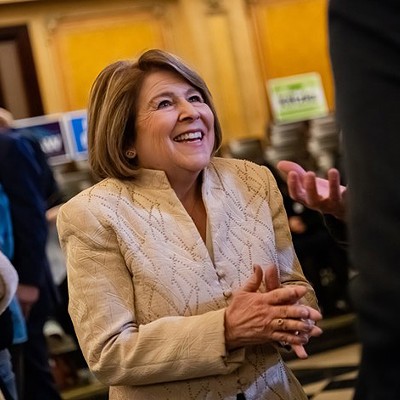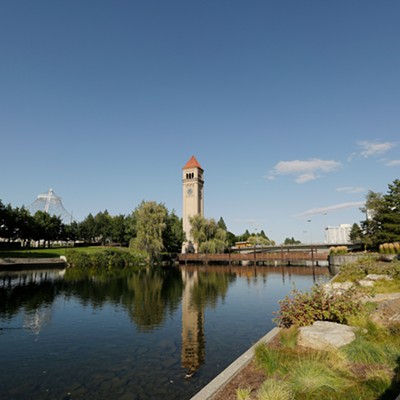Crunch time downtown 12/24/96
[
{
"name": "Broadstreet - Instory",
"component": "25846487",
"insertPoint": "4",
"requiredCountToDisplay": "4"
},{
"name": "Broadstreet - Empower Local",
"component": "27852456",
"insertPoint": "8",
"requiredCountToDisplay": "8"
},{
"name": "Broadstreet - Instory",
"component": "25846487",
"insertPoint": "12",
"requiredCountToDisplay": "12"
},{
"name": "Broadstreet - Instory - 728x90 / 970x250",
"component": "27852677",
"insertPoint": "18",
"requiredCountToDisplay": "18"
},{
"name": "Broadstreet - Instory",
"component": "25846487",
"insertPoint": "5th",
"startingPoint": "23",
"requiredCountToDisplay": "24",
"maxInsertions": 100
}
]
by Ted S. McGregor, Jr.
In early October, the developers planning to renovate River Park Square -- and in the process, they say, revitalize downtown Spokane -- were only a few days and one public meeting away from the city joining them in a public-private partnership that would bring a new, larger Nordstrom store and retail complex to two square blocks of downtown. Since that time, however, the original partnership plan has been replaced by a new, relatively untested one.
Meanwhile, the developer's own deadline seems to be coming and going. In early October, a spokeswoman for the project said that construction could begin by January and warned that if a decision wasn't reached by the end of 1996, the developers could lose their agreement with Nordstrom to stay in Spokane. The developers have said from the beginning that without the city's participation, the deal would be impossible to accomplish. The developers are now looking to Jan. 13, when the city may vote on whether to formally endorse the project.
The public partnership is being sought to have someone other than the developers purchase the River Park Square parking garage, as a way to lessen the burden of cost on the developers, Spokane's Cowles family. The total cost of the project is expected to top out at more than $100 million. In many cities across the U.S., public-private partnerships have been formed to help bring projects to life, and parking is one way that municipalities can legally participate in private business.
When you compare the plan that was under consideration by the city prior to the Oct. 17 public hearing to the plan being pursued today, the differences are both obvious and subtle. Under the original plan, the city would have issued revenue bonds to purchase the garage (for nearly $30 million). Under the new plan, a quasi-governmental commission -- the Public Development Authority (PDA) -- would operate the facility, which would be owned by a developer-created nonprofit corporation. After the nonprofit pays off the bonds in 20 years, the city would then take over ownership of the garage.
The original plan is the one, with some variations, that has been used by cities across the country, including Seattle, Portland and San Francisco. The new plan, however, is complex and appears to be a pioneering effort on the part of Spokane.
"We're doing pioneering because we're trying to be more cautious with the city's money, " says Roy Koegen, Spokane's bond attorney since the 1970s.
Although Koegen believes the new financial structure is sound and will attract investors, it is still unknown how the bond market will react to the plan. The bond market is strong today, and there is a lot of capital available, but under normal circumstances, a nonprofit corporation with no assets would be hard pressed to convince brokers to invest.
The strength of the original plan was that the bonds would be secured by the city's good credit and the guarantee of parking meter revenues in case the bond payments couldn't be met. The only time parking meter money would be used under the new plan is in the case of an operating shortfall. Although it seems like pledging parking meter revenue is done in both cases, city officials argue that the new plan significantly limits the risk to that money (which amounted to $1.6 million in 1995).
The difference in the amount of risk, says Koegen, is vast because the dollar figure that bond payments are likely to be exceeds by far the figure that could be realized as a shortfall in operating the garage and paying rent on the land.
"We have stepped back from this, I think, three large steps, " says City Councilwoman Roberta Greene. "We want to be a partner, but we're not the ones out on the limb. "
Greene is quick to add that the city is doing all it can to work with the developers' increasingly tight timeline.
To find out how the bond market will respond to the financing plan, a delegation from the city recently traveled to San Francisco to present the deal to Standard and Poor's and Moody's, which rate bonds for the brokerage market. The city and the developers hope to have an indication of a rating by the end of the year. If a certain threshold is met and the bonds become attractive to banks, the interest rate -- and the cost of the project -- will be more favorable. Without a good rating, the result is junk bonds and, very likely, no deal.
Greene and Koegen both raised the possibility that the rating agencies might list conditions that would have to be met for the bonds to be given an investment grade. In that case, the city would have to consider whether to endorse any additional tweaking of the plan.
While the new, complex financing package becomes clearer, some are still wondering why the city got cold feet in the first place. Most point to the public hearing on Oct. 17 as the turning point. Although testimony was evenly split between people for and against the city joining the project, the outpouring against the project was more extensive than many expected.
Assistant City Manager Pete Fortin says the reason for the change in strategy is simple: "The council listened very clearly to the testimony that was given in October, and they came up with a structure that reflects the moods or the desires of the people. "
Could it be that the critics of the project started making sense to city officials? At the Oct. 17 hearing, representatives of the Sabey Corporation, owners of NorthTown, testified that the economic analysis provided by the developers to back up the project is flawed, and a representative of ACT III Theaters testified that in order to succeed, River Park Square's planned 24-screen theater would have to double the Spokane market's movie-going audience overnight.
The underlying question critics have had with the entire project has been whether it fosters new economic growth, which would translate into more tax dollars for the city, or if it simply reshuffles the existing deck of Spokane retail. The developers have predicted that a specialty mall of this kind would bring in more shoppers from places like Boise and Missoula, while critics, like Spokane attorney Steve Eugster, have said that "retailing in the Spokane market is a zero-sum game. " Meaning: you can put a new mall in downtown, but that doesn't mean there will be any new customers to shop there.
The Sabey Corporation's interest in the issue, which has been called dubious by some, has to do with what's best for Spokane as a whole, says Laurent Poole, executive vice president.
"The only way to increase retail sales and tax income for the city is by improving the economy and raising personal incomes -- not by building more retail space, " says Poole, who thinks the city should focus its energies on bringing more good employers to Spokane.
But backers of the project and the city's participation in it are just as adamant as the critics, saying the stakes relating to the project are as high as anything since Expo '74. Many downtown supporters, including developers Don Barbieri and Ron Wells, believe a revitalized River Park Square will be the key to a downtown renaissance, leading to greater opportunities for housing and even in helping attract new businesses with high-paying jobs to the region. And city officials struggling with flat tax revenues and a growing list of needs are anxious to be the catalyst for some kind of economic shot in the arm.
But with only two studies -- and both of them controversial -- to rationalize the construction of the mall and the city's purchase of the garage, city officials decided to engage a third party to study the project and its feasibility. (The Walker parking study, commissioned by the city to help set the value of the garage, has been criticized for only examining a best-case scenario. And the Eacret economic analysis, commissioned by the developers to show the economic benefits of the project to the city, has similarly been called into question by critics of the public financing plan.)
Coopers & amp; Lybrand of San Francisco agreed to conduct the study, and armed with documentation from both the city and the developers, it should be releasing its results by mid-January, Greene says.
Although some are concerned that the Coopers & amp; Lybrand study will amount to more of an audit than a second opinion, Greene is expecting a document that will shed more light on the prospects of success for the mall and the garage.
"That study will be crucial to the decision we are going to make, " she says.
In early October, the developers planning to renovate River Park Square -- and in the process, they say, revitalize downtown Spokane -- were only a few days and one public meeting away from the city joining them in a public-private partnership that would bring a new, larger Nordstrom store and retail complex to two square blocks of downtown. Since that time, however, the original partnership plan has been replaced by a new, relatively untested one.
Meanwhile, the developer's own deadline seems to be coming and going. In early October, a spokeswoman for the project said that construction could begin by January and warned that if a decision wasn't reached by the end of 1996, the developers could lose their agreement with Nordstrom to stay in Spokane. The developers have said from the beginning that without the city's participation, the deal would be impossible to accomplish. The developers are now looking to Jan. 13, when the city may vote on whether to formally endorse the project.
The public partnership is being sought to have someone other than the developers purchase the River Park Square parking garage, as a way to lessen the burden of cost on the developers, Spokane's Cowles family. The total cost of the project is expected to top out at more than $100 million. In many cities across the U.S., public-private partnerships have been formed to help bring projects to life, and parking is one way that municipalities can legally participate in private business.
When you compare the plan that was under consideration by the city prior to the Oct. 17 public hearing to the plan being pursued today, the differences are both obvious and subtle. Under the original plan, the city would have issued revenue bonds to purchase the garage (for nearly $30 million). Under the new plan, a quasi-governmental commission -- the Public Development Authority (PDA) -- would operate the facility, which would be owned by a developer-created nonprofit corporation. After the nonprofit pays off the bonds in 20 years, the city would then take over ownership of the garage.
The original plan is the one, with some variations, that has been used by cities across the country, including Seattle, Portland and San Francisco. The new plan, however, is complex and appears to be a pioneering effort on the part of Spokane.
"We're doing pioneering because we're trying to be more cautious with the city's money, " says Roy Koegen, Spokane's bond attorney since the 1970s.
Although Koegen believes the new financial structure is sound and will attract investors, it is still unknown how the bond market will react to the plan. The bond market is strong today, and there is a lot of capital available, but under normal circumstances, a nonprofit corporation with no assets would be hard pressed to convince brokers to invest.
The strength of the original plan was that the bonds would be secured by the city's good credit and the guarantee of parking meter revenues in case the bond payments couldn't be met. The only time parking meter money would be used under the new plan is in the case of an operating shortfall. Although it seems like pledging parking meter revenue is done in both cases, city officials argue that the new plan significantly limits the risk to that money (which amounted to $1.6 million in 1995).
The difference in the amount of risk, says Koegen, is vast because the dollar figure that bond payments are likely to be exceeds by far the figure that could be realized as a shortfall in operating the garage and paying rent on the land.
"We have stepped back from this, I think, three large steps, " says City Councilwoman Roberta Greene. "We want to be a partner, but we're not the ones out on the limb. "
Greene is quick to add that the city is doing all it can to work with the developers' increasingly tight timeline.
To find out how the bond market will respond to the financing plan, a delegation from the city recently traveled to San Francisco to present the deal to Standard and Poor's and Moody's, which rate bonds for the brokerage market. The city and the developers hope to have an indication of a rating by the end of the year. If a certain threshold is met and the bonds become attractive to banks, the interest rate -- and the cost of the project -- will be more favorable. Without a good rating, the result is junk bonds and, very likely, no deal.
Greene and Koegen both raised the possibility that the rating agencies might list conditions that would have to be met for the bonds to be given an investment grade. In that case, the city would have to consider whether to endorse any additional tweaking of the plan.
While the new, complex financing package becomes clearer, some are still wondering why the city got cold feet in the first place. Most point to the public hearing on Oct. 17 as the turning point. Although testimony was evenly split between people for and against the city joining the project, the outpouring against the project was more extensive than many expected.
Assistant City Manager Pete Fortin says the reason for the change in strategy is simple: "The council listened very clearly to the testimony that was given in October, and they came up with a structure that reflects the moods or the desires of the people. "
Could it be that the critics of the project started making sense to city officials? At the Oct. 17 hearing, representatives of the Sabey Corporation, owners of NorthTown, testified that the economic analysis provided by the developers to back up the project is flawed, and a representative of ACT III Theaters testified that in order to succeed, River Park Square's planned 24-screen theater would have to double the Spokane market's movie-going audience overnight.
The underlying question critics have had with the entire project has been whether it fosters new economic growth, which would translate into more tax dollars for the city, or if it simply reshuffles the existing deck of Spokane retail. The developers have predicted that a specialty mall of this kind would bring in more shoppers from places like Boise and Missoula, while critics, like Spokane attorney Steve Eugster, have said that "retailing in the Spokane market is a zero-sum game. " Meaning: you can put a new mall in downtown, but that doesn't mean there will be any new customers to shop there.
The Sabey Corporation's interest in the issue, which has been called dubious by some, has to do with what's best for Spokane as a whole, says Laurent Poole, executive vice president.
"The only way to increase retail sales and tax income for the city is by improving the economy and raising personal incomes -- not by building more retail space, " says Poole, who thinks the city should focus its energies on bringing more good employers to Spokane.
But backers of the project and the city's participation in it are just as adamant as the critics, saying the stakes relating to the project are as high as anything since Expo '74. Many downtown supporters, including developers Don Barbieri and Ron Wells, believe a revitalized River Park Square will be the key to a downtown renaissance, leading to greater opportunities for housing and even in helping attract new businesses with high-paying jobs to the region. And city officials struggling with flat tax revenues and a growing list of needs are anxious to be the catalyst for some kind of economic shot in the arm.
But with only two studies -- and both of them controversial -- to rationalize the construction of the mall and the city's purchase of the garage, city officials decided to engage a third party to study the project and its feasibility. (The Walker parking study, commissioned by the city to help set the value of the garage, has been criticized for only examining a best-case scenario. And the Eacret economic analysis, commissioned by the developers to show the economic benefits of the project to the city, has similarly been called into question by critics of the public financing plan.)
Coopers & amp; Lybrand of San Francisco agreed to conduct the study, and armed with documentation from both the city and the developers, it should be releasing its results by mid-January, Greene says.
Although some are concerned that the Coopers & amp; Lybrand study will amount to more of an audit than a second opinion, Greene is expecting a document that will shed more light on the prospects of success for the mall and the garage.
"That study will be crucial to the decision we are going to make, " she says.





















